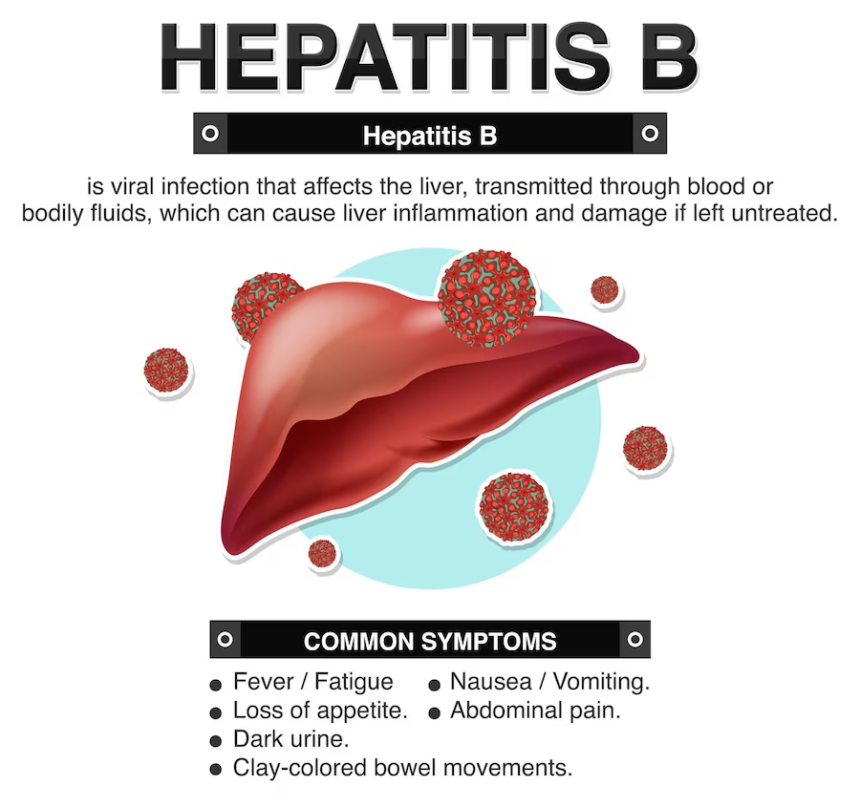Hepatitis B is a viral infection that affects the liver and can have serious long-term consequences if left untreated. It is a significant public health concern globally, including in South Africa. Understanding the causes, transmission, symptoms, and prevention methods of hepatitis B is crucial for individuals, healthcare providers, and communities to effectively combat this infectious disease.
Causes and Transmission:
Hepatitis B is caused by the hepatitis B virus (HBV). It can be transmitted through various means, including:
- Unprotected Sexual Contact: Hepatitis B can be spread through unprotected sexual intercourse with an infected person, especially if there are micro-tears or open sores.
- Contact with Infected Blood: Sharing needles or other drug paraphernalia contaminated with infected blood, or coming into contact with blood from an infected person (e.g., through needlestick injuries or accidental exposure to blood in healthcare settings), can transmit the virus.
- Mother-to-Child Transmission: Pregnant women with hepatitis B can pass the infection to their infants during childbirth. However, this risk can be significantly reduced with appropriate interventions, such as vaccination for newborns and administration of hepatitis B immunoglobulin.
- Sharing Personal Items: Sharing personal items that may come into contact with infected blood, such as razors or toothbrushes, can increase the risk of transmission.
- Medical Procedures: Receiving medical procedures with improperly sterilized equipment or from inadequately trained healthcare providers can contribute to the spread of hepatitis B.
Symptoms:
Hepatitis B symptoms can vary from mild to severe and may include:
- Fatigue and Weakness: Persistent fatigue, weakness, and lack of energy are common symptoms of hepatitis B.
- Jaundice: Jaundice causes a yellowing of the skin and eyes, indicating liver dysfunction.
- Abdominal Pain: Some individuals may experience abdominal pain or discomfort, often in the area of the liver.
- Nausea and Vomiting: Hepatitis B can cause nausea, vomiting, and a loss of appetite.
- Dark Urine and Pale Stools: Changes in urine color (darkening) and stool color (becoming pale) can be signs of hepatitis B-related liver dysfunction.
Prevention:
Preventing hepatitis B involves a combination of vaccination, safe practices, and awareness:
- Vaccination: The hepatitis B vaccine is the most effective way to prevent infection. It is recommended for all infants and children, healthcare workers, individuals with high-risk behaviors (such as multiple sexual partners or injection drug use), and those with specific medical conditions.
- Safe Sexual Practices: Practicing safe sex, including using condoms, can reduce the risk of hepatitis B transmission during sexual activity.
- Avoid Sharing Needles: Never share needles or any equipment used for injecting drugs. If you are a healthcare worker, follow appropriate safety precautions to prevent needlestick injuries.
- Practice Universal Precautions: Healthcare providers should adhere to universal precautions, including proper sterilization of medical equipment and use of protective barriers (such as gloves) to prevent the spread of hepatitis B.
- Screening and Treatment: Individuals who are at risk or have been exposed to hepatitis B should undergo regular screening. Early detection allows for timely medical intervention and reduces the risk of complications.
- Public Awareness and Education: Raising awareness about hepatitis B through community outreach, education campaigns, and access to accurate information can promote prevention and encourage individuals to seek testing and vaccination.
It is important for healthcare providers to offer testing and counseling services to individuals at risk of hepatitis B infection. They should also ensure the availability and affordability of vaccines to promote widespread immunization.
In South Africa, the Department of Health has implemented various programs to combat hepatitis B, including vaccination campaigns, prevention strategies, and public education initiatives. Individuals can consult healthcare providers, clinics, or local health departments for information on testing, vaccination, and resources related to hepatitis B.
By understanding the causes, transmission routes, symptoms, and prevention methods of hepatitis B, individuals and communities in South Africa can take proactive steps to prevent the spread of this infectious disease and protect their liver health.










